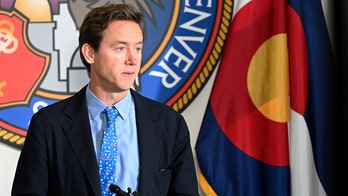WASHINGTON – The anti-establishment political tide that ousted a three-term GOP senator in Utah has spread well beyond the tea party.
It toppled a longtime Democratic congressman from West Virginia on Tuesday, and several White House-favored lawmakers elsewhere are confronting liberal voters who don't want party elites telling them what to do.
In Pennsylvania, many Democratic voters seem unmoved by President Barack Obama's pleas to embrace former Republican Arlen Specter in next Tuesday's Senate primary.
Specter's nomination seemed virtually assured last year when the entire Democratic establishment, including Gov. Ed Rendell, backed him in exchange for his switch from the GOP. But Rep. Joe Sestak, who bills himself as the contest's true Democrat, has erased Specter's big lead in the polls.
The May 18 vote is expected to be close, and Obama has cut a last-minute TV ad for Specter in hopes of avoiding an embarrassing upset.
Should Specter lose, he would be the third prominent politician in a month to fall in intraparty contests dominated by restless voters who show little respect for well-established figures and party leaders.
In Florida, Republican Gov. Charlie Crist was expected to cruise into the Senate, with barely a thought to his party's primary. But conservative Marco Rubio and tea party activists drove Crist out of the GOP, and he is running as an independent.
In Utah, 17-year Senate veteran Bob Bennett fell victim Saturday to the once-unthinkable claim that he's not conservative enough for the Republican Party. His sins, according to tea party activists who taunted him at a GOP convention, include voting for the 2008 bank bailout pushed by Republican President George W. Bush.
In Democratic races, Sens. Blanche Lincoln of Arkansas and Michael Bennet of Colorado are battling viable primary opponents attacking them from the left. Obama supports both incumbents, but their challengers portray themselves as more faithful to Democratic priorities.
In West Virginia, 14-term Rep. Alan Mollohan lost the Democratic nomination for his seat to state Sen. Mike Oliverio on Tuesday. Oliverio attacked Mollohan from the right, rather than the left, and focused on the lawmaker's history of ethics probes.
In today's climate of angry voters, "being an incumbent or defined as the establishment is the political equivalent of wearing the scarlet letter," said Chris Lehane, a California-based consultant who worked for Al Gore's 2000 presidential campaign.
Anti-establishment forces are particularly potent in small voter pools, such as the convention-based Utah process that toppled Bennett, he said.
Perhaps the clearest example of veteran lawmakers' woes is the tough challenge being thrown at Sen. John McCain of Arizona -- the GOP's presidential nominee two years ago -- by conservative J.D. Hayworth, a former House member.
Establishment politicians are faring fine in some states, although a few had to placate their party's base. Five-term GOP Sen. Charles Grassley of Iowa beat back talk of a Republican challenge from the right, in part by abandoning negotiations with Democrats on a massive health care bill last year.
Some elected officials say bipartisanship is the biggest victim of strong anti-establishment movements. One factor cited in the Utah Republicans' rejection of Bennett, who had a lifetime rating of 84 percent from the American Conservative Union, was his bid to forge a health care compromise with Sen. Ron Wyden, D-Ore.
The Wyden-Bennett bill went nowhere. But the Utah events show the Republican base "doesn't want them to compromise" at all, House Majority Leader Steny Hoyer, D-Md., said. "The Republican Party now has the narrowest base that I have seen" since entering Congress 29 years ago, Hoyer said.
Republican voters in Kentucky also are showing scant interest in their party leaders' wishes. Senate Minority Leader Mitch McConnell worked for months to push his GOP seatmate, Sen. Jim Bunning, out of a re-election bid, fearing Bunning would lose to a Democrat.
McConnell cleared the path for Kentucky Secretary of State Trey Grayson, seen as the Republican establishment candidate.
But tea party favorite Rand Paul has led in recent polls, and a worried McConnell formally endorsed Grayson two weeks before the May 18 primary.
Paul, son of the former libertarian presidential candidate Ron Paul, has said he might not support McConnell as Republican leader if he's elected. Bunning, still fuming over McConnell's actions, has endorsed Paul.
Democrats have a slightly less vitriolic squabble in Arkansas. Lincoln, who's seeking a third term, infuriated labor union activists and others by opposing Obama's health care plan. Lt. Gov. Bill Halter challenged her, saying the party deserves an unapologetic Democrat as its Senate nominee.
Even if Lincoln survives next week's primary, she faces a stiff challenge in the Nov. 2 general election.
Senate Majority Leader Harry Reid, D-Nev., also is in serious trouble this year, but his re-election problems loom in November, not the primary.
Despite their civil wars in Utah, Florida and Kentucky, Republicans believe an anti-incumbent mood will hurt them less than it hurts Democrats, who control Congress and the White House. Some GOP lawmakers may fall in party primaries, said Gentry Collins, the Republican National Committee's political director.
"But Democrats are the incumbent party in Washington," Collins said, "and I think it's a much steeper hill for them to climb."




